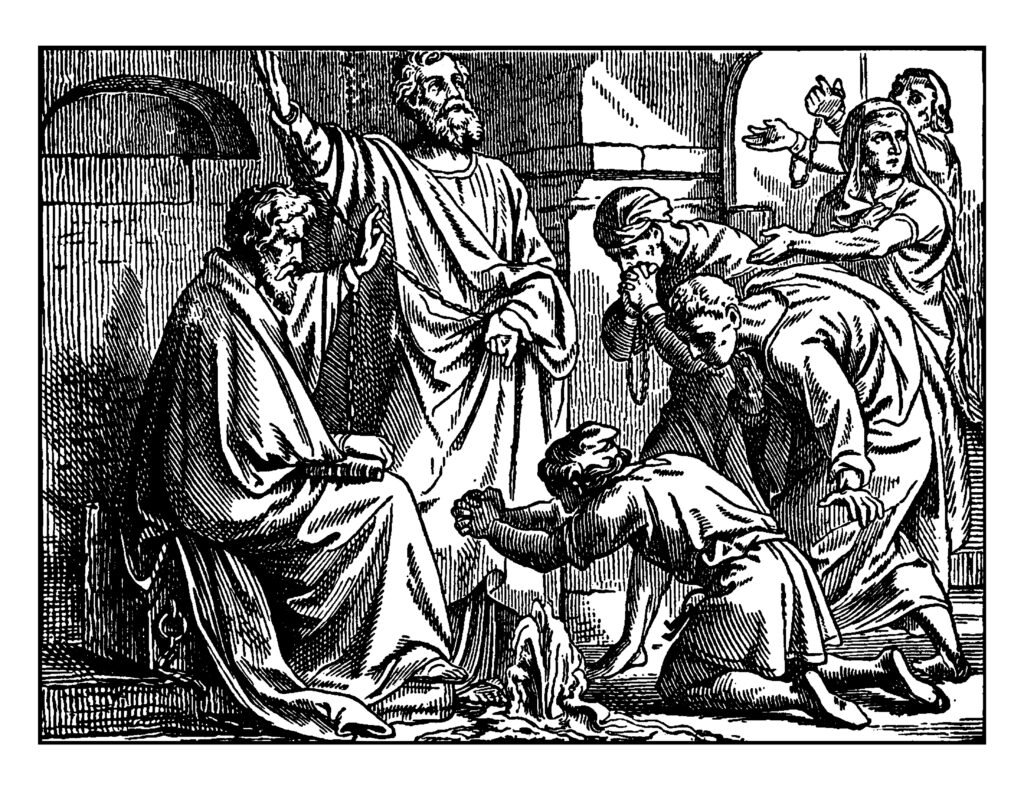*Author’s Note: Paul’s encounter with Christ led him to a greater understanding of the faith, and from that encounter, Paul developed a theology of mission that affected everything about him, specifically in four areas:
- The nature of his call and conversion, and his role as an apostle to the Gentiles,
- Paul’s gospel-centered preaching, building on Old Testament promises, fulfilled in the death, burial, and resurrection of Christ,
- Paul’s practice of contextualization, in both church planting and disciple making, and
- Paul’s experience of persecution and suffering for the sake of Christ, in which he chose to boast.
Each of these contributes to the missiology of Paul, and from them, we can learn much about God’s missio Dei, his desire to reach all nations with the good news of Jesus Christ, and the offer of salvation he extends to each of us. In this article, we’ll explore the nature of Paul’s experience of persecution and suffering, and how this formed Paul’s theology of mission.
The topics of pain and suffering are a significant thread through Paul’s letters, and his experiences with them had a profound impact upon his ministry and his missiology. Not only did Paul teach that suffering would take place, but he lived it himself (Acts 20.22-24).[1] From Paul, we can gain insight into the nature of suffering, its redemptive purpose, and why Paul could use his afflictions as a basis for boasting.
The Nature of Suffering
Pain and suffering are an inherent part of this fallen creation, although not originally intended at creation. Suffering is an intrusion; when mankind fell and sin entered the world, “suffering also entered in the form of conflict, pain, corruption, drudgery and death” (see Genesis 3:15-19).[2]
Suffering takes different forms, such as mental or physical, deserved or undeserved. The suffering Paul endured for the gospel was something he neither sought nor merited. But as something he experienced for the sake of Christ, such suffering holds a tremendous power and purpose.
“As something he experienced for the sake of Christ, such suffering holds a tremendous power and purpose.”
Suffering’s Redemptive Purpose
When considering his own suffering, or writing of the suffering of others, Paul encouraged people to remember that such afflictions were not random or meaningless, but rather were an opportunity to connect more deeply with Christ, and to participate in his suffering. Paul wrote to the Philippian church that he wanted to “know him and the power of his resurrection, and share his sufferings, becoming like him in his death” (Philippians 3:10, cf. 1:29; 2 Timothy 3:12).
Sharing in Jesus’ sufferings served to accomplish at least three things. First, it provided comfort and encouragement to those who were experiencing such trials. God can use afflictions to provide comfort so that we can, in turn, provide comfort to others in their own experiences (2 Corinthians 1:3-4). Second, suffering can actually advance the gospel. Paul uses his own experience of prison as an example. His affliction emboldened others to share the message of God’s Word without fear (Philippians 1:12-14). An unwavering commitment to the gospel, even when faced with persecution, is inspiring. Third, Paul understood that suffering had an eternal element and a redemptive purpose. There is an element of hope to affliction. Paul tells the church in Rome that suffering for Christ is directly connected to being glorified with him. He states, “I consider that the sufferings of this present time are not worth comparing with the glory that is to be revealed to us” (Romans 8:18).
“I consider that the sufferings of this present time are not worth comparing with the glory that is to be revealed to us.”
The Impact of Suffering
Paul’s experiences with trials and difficulties—even beatings and imprisonment—fueled his boldness. He saw his suffering as a testimony to the truth of the Gospel and used it to encourage others. His experiences also allowed Paul to fully relate to the churches he established as they experienced persecution. As he sought to persevere, he could encourage others to imitate him, as he imitated Christ (1 Corinthians 11:1).
The marks of suffering—often physical scars or impairments—were not seen as a strength in Paul’s culture. In fact, it was generally regarded as a weakness, and as an indication of low social status, servitude, or slavery.[3] The more scars one had, the more he was assumed to be incorrigible, needing frequent punishment. The marks of affliction were not a status symbol; they were “insignia of humiliation and submission.”[4]
In spite of this, Paul claimed that he could boast of his marks of suffering. He goes into great descriptive detail in 2 Corinthians 11:23-33 of his experiences, concluding, “If I must boast, I will boast of the things that show my weakness” (2 Corinthians 11:30).[5] Paul is acutely aware of how his sufferings unite him with Christ, and in anticipation of the Corinthians’ questions about how he could boast of such things, Paul states, “For he was crucified in weakness, but lives by the power of God. For we also are weak in him, but in dealing with you we will live with him by the power of God” (2 Corinthians 13:4; cf. 12:9-10). Paul does not stand on his own strengths; he unites himself with Christ’s humiliation and allows God’s power to be declared through his suffering.[6]
“If I must boast, I will boast of the things that show my weakness.”
A Spiritual, Biblical, and Human Task
As the fourth article of a four-part series on Paul as missionary, this is an ideal place to draw some application for how God’s mission plays out in our lives today.
The missiology of Paul isn’t simply a theoretical or academic concept. It holds implications and applications for the role of the church—both corporately and individually—in the mission of God in the twenty-first century. Even though advances in technology have made the mission easier, there still remains a significant amount of work to be done in order to see “every people group be reached with the testimony of Christ and that a people be called out from his name from all the nations.[7] Paul’s passion for reaching the nations can be ours as well, because as we have seen, the promise given to Abraham will be a blessing to all the nations of the earth (Genesis 12:1-3; Galatians 3:26-29; Psalm 67).
Therefore, the missio Dei is first and foremost a spiritual task.[8] Salvation is from God. While he may choose to use people in accomplishing this in the lives of people, God—and God alone—saves. Paul was certainly aware of this, and he refers to the work of God in our lives, through the Holy Spirit, in every letter except Philemon.[9] Paul relies on the Holy Spirit to convict and convert (1 Thessalonians 1:5), to renew and regenerate (Titus 3:5), to produce fruit in the lives of believers (Galatians 5:22-23), to intercede on our behalf (Romans 8:26-27), to give spiritual gifts (1 Corinthians 12-14; Romans 12), to reveal wisdom (1 Corinthians 2:10-14), to foster unity (Ephesians 4:3), and more. Truly, the mission of God is a task in which he leads and directs. It’s his mission.
“The mission of God is a task in which he leads and directs.”
It’s also a biblical task. The missio Dei is clearly seen from the beginning of the Bible to the end. It’s his mission, but he has invited us to participate.
“Fundamentally, our mission (if it is biblically informed and validated) means our committed participation as God’s people, at God’s invitation and command, in God’s own mission within the history of God’s world for the redemption of God’s creation.…Our mission flows from and participates in the mission of God.”[10]
God’s desire to seek and save all peoples of the earth is evident on almost every page of Scripture.
Finally, it’s also a human task. God desires our involvement. He has chosen people to be his instruments in sharing the message of the good news to others, just as he chose Paul on the Road to Damascus (Acts 9:14). His desire is to allow us to partner with him in this work.
“There was no ‘mission’ in the Garden of Eden and there will be no ‘mission’ in the new heavens and the new earth (though the results of ‘mission’ will be abundantly evident). From the first glimmer of the gospel in Genesis 3:15 to the end of this age, however, mission is necessitated by humanity’s fall into sin and need for a Savior and made possible only by the saving initiative of God in Christ.”[11]
Conclusion
The ultimate goal of Paul’s missiology—and even all of his work, his travels, his sufferings—was that people be saved.[12] To do that, he preached the message of Good News, sharing what God has done to redeem humanity; he created disciples and encouraged their spiritual formation; he planted churches and encouraged them to plant more churches; he did whatever it took to spread the message of the gospel to the nations.
Paul wept, he rejoiced, he endured physical abuse and spiritual turmoil. He encouraged, he exhorted, he rebuked when needed. But above all, Paul seems to have been centered on two foundational realities.
First, he relied on the work of the Holy Spirit. Paul would likely be the first to reject any credit to himself and pass it all on to God. “I planted…but God gave the growth” (1 Corinthians 3:6). And second, Paul’s life and ministry were rooted in prayer. Over and over, Paul reminds his readers to pray, and of how he continues to pray for them.
“Over and over, Paul reminds his readers to pray, and of how he continues to pray for them.”
If we are to be effective in participating in the missio Dei in our own settings, these two characteristics are nonnegotiable: we must rely on the Holy Spirit to work, and we must be rooted in prayer. Prayer was what made Paul who he was. “His life’s work had been to bear witness, openly and unhindered, to the Kingdom of God and the lordship of Jesus.”[13] We would do well to strive for the same goal.
[1] Wade Landers, “New Testament Missiology, Part Three” (Lecture, Ozark Christian College, Joplin, MO, July 7, 2023).
[2] R. S. Wallace, “Suffering,” in New Bible Dictionary, ed. D. R. W. Wood, I. H. Marshall, A. R. Millard, J. I. Packer, and D. J. Wiseman (Downers Grove: InterVarsity Press, 1996), 1136. All Scripture references are from the English Standard Version, unless otherwise noted.
[3] Jennifer A. Glancy, “Boasting of Beatings (2 Corinthians 11:23-25),” Journal of Biblical Literature 123, no. 1 (Spring 2004): 111, 124.
[4] Glancy, “Boasting of Beatings,” 99, 108.
[5] Glancy, “Boasting of Beatings,” 126.
[6] Paul Barnett, The Message of 2 Corinthians: Power in Weakness, ed. John R. W. Stott, The Bible Speaks Today (Leicester, Downers Grove: Inter-Varsity Press, 1988), 178-179.
[7] John Piper, Let the Nations Be Glad! The Supremacy of God in Missions, (Grand Rapids: Baker Academic, 2022), 155.
[8] George W. Peters, A Biblical Theology of Missions, (Chicago: Moody Press, 1972), 159-166. I am indebted to Peters’ descriptions of the aspects of the tasks of missions. While he divides this into four categories, I choose to use three, while still borrowing his titles.
[9] While the Holy Spirit may not be explicitly mentioned in Philemon, his fingerprints are all over this brief correspondence.
[10] Christopher J. H. Wright, The Mission of God: Unlocking the Bible’s Grand Narrative (Downers Grove: InterVarsity Press, 2018), 22-23.
[11] Andreas J. Köstenberger, Salvation to the Ends of the Earth: A Biblical Theology of Mission (London, Downers Grove: Apollos; InterVarsity Press, 2020), 241.
[12] Richard Last, “What Purpose Did Paul Understand His Mission to Serve?,” Harvard Theological Review 104, no. 3 (July 15, 2011): 324.
[13] N. T. Wright, Paul: A Biography (New York: HarperOne, 2020), 431-432.











